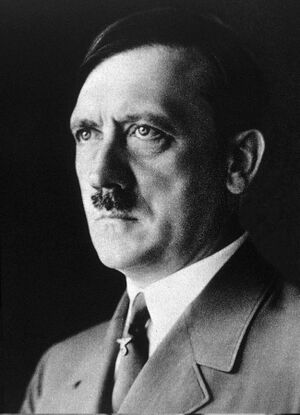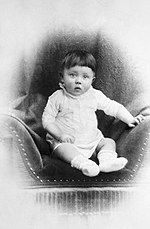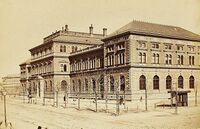Martin Winter
Führer und Reichskanzler des Altisches Reich Martin Winter | |
|---|---|
 Official portrait, 1933 | |
| In office 17 April 1928 – Present | |
| Deputy | Peter Pappenheim |
| Preceded by | Siegfried III (1895 - 1928) |
| Chancellor of the Altisches Reich | |
| In office 10 August 1926 – Present | |
| Preceded by | Erich Hättener |
| Führer of the Valkist Party | |
| In office 12 January 1922 – Present | |
| Preceded by | Wilhelm Kohl (Party Chairman) |
| Personal details | |
| Born | Martin Joseph Neumann-Winter 11 April 1891 Wesselheim, Esseter, Altenland |
| Citizenship | Altish |
| Political party | |
| Military service | |
| Allegiance | |
| Branch/service | Imperial Altish Army |
| Years of service | 1912 - 1920 |
| Rank | Unteroffizier |
| Unit | 11th Esseteran Shock Regiment |
| Battles/wars | TBD. |
| Awards | Iron Cross First Class
Iron Cross Second Class Velvet Charge |
Martin Winter, born Martin Joseph Neumann-Winter, is an Altish politician serving as dictator of Altenland. A veteran of the Great War, Winter rose to power as the leader of the Valkist Party, becoming Chancellor in 1926 and taking the title of Führer und Reichskanzler in 1928. As Führer, Martin Winter has overseen the transformation of the Altish Empire into the ultranationalist valkist Altisches Reich.
Winter was born in Wesselheim, in the Altish state of Esseter, and was raised in the nearby village of Hamstedt. He was decorated during his service in the Altish Army in the Great War, serving for the duration of the conflict. In early 1920, he joined with like-minded veterans in an early Vorhut organization in Münzen, and participated in the violent suppression of communist revolutionary movements in the state of Lauenmark during this time, and became an influential figure among the Altish reactionary right in that part of the country. In September of 1920, the Münzen Putsch was carried out by Vorhut members and ended in failure. Although Winter did not participate in the putsch and had attempted to discourage his comrades from seeing it through, he was convicted on charges of conspiracy and treason and sentenced to two years in prison, though only served fourteen months. While in prison, he dictated the first volume of his autobiography and political manifesto titled Eine Neue Ordnung ("A New Order"). After his release, Winter worked to reform the various Vorhut movements in southern Altenland - now outlawed - into a proper political party, which would eventually develop into the Valkistiche Volkspartei, or VV. He gained popular support by attacking the post-Great War order and promoting pan-Altishism, Valkism, and rabid anti-socialism and anti-communism with charasmatic oratory and propaganda.
By 1926, the Valkist Party had formed a coalition with other right-wing political organizations known as the Reichsbund, and achieved a major victory in the 1926 Altish federal elections. With his coalition, Winter was able to leverage Kaiser Siegfried III to appoint him as chancellor on 10 August. Shortly thereafter, the discovery of the Hochstadt Plot was used as justification to pass the Sicheres Altenland Decree in February 1927 and then the Neureich Act in March 1928, which began the process of transforming the Altish Republic into Valkist Altenland, a one-party dictatorship based on the authoritarian and autocratic ideology of Valkism. Upon the Kaiser's abdication in October 1928, Winter succeeded him, becoming simultaneously head of state and government, and the powers of these two offices were later merged to make Winter Führer und Reichskanzler of Altenland.
Winter seeks to establish a New Order to counter what he sees as the injustice of the post-Great War international order and establish a model Valkist state. Since coming to power, Winter has overseen rapid economic recovery, the abrogation of restrictions imposed on Altenland after the Great War as seen by ambitious military rearmament and military restructuring, and the controversial annexation of Reynland- the prize of the Great War that was surrendered by Kaiser Siegfried III at the negotiating tables of Verdon.
Ancestry
See also: Winter Family
Winter's father, Paul Winter (1856-1906) was born into an aristocratic family in Esseter, then a constituent state of the Altish Empire. His father (Winter's grandfather), Adolf Winter, served in the Esseter Army during the War of Altish Unification alongside armies from the Kingdom of Almeria, serving as an officer and gaining notoriety in the July 1838 Battle of Aachen Forest. With the formation of the Altish Empire in 1840, Adolf Winter secured the position of his family among the Altish aristocracy and would become among the most influential in Esseter. Paul Winter was born on 19 October 1856 and was the seventh of nine living children in the Winter family. At the behest of his father, Paul enlisted in the Imperial Altish Army and served during the Küstern War of 1875-76, during which he suffered a lower-leg amputation on his right side and was permanently disabled, utilizing a wooden prosthetic for the remainder of his life and suffering from a debilitating alcohol addiction.
Paul Winter married Karolina Freudenberg in 1881 and the couple had three children together, although the second child - Stephen - died in his infancy. Karolina divorced Paul in 1889, citing his alcoholism. Paul met Helena Neumann, a servant girl at his family estate, in early 1890 and expressed his desire to marry her to his father, who refused to allow it due to Helena not being of noble blood. When Helena fell pregnant in the summer of 1890, Paul's father refused to support a marriage between the two, as Helena descended from the peasant class. As a result, Paul left his family's estate and moved with Helena to Wesselheim, the capital of Esseter, where Paul got a job as a barkeep at a local beer hall.
Early Life
Childhood and education
Martin Joseph Neumann-Winter was born on 11 April 1891 in Wesselheim. His name was hyphenated to reflect his unwed parents' last names, likely as a means of insulting Paul's father, Adolf Winter. He is the first of four children that would be born to Paul and Helena. Two of his siblings - Franz and Heinrich - died in infancy, and his younger sister Greta was born in 1899. Also living in the household were Paul's children from his previous marriage, with his son Stephan and daughter Paula having moved to Wesselheim in 1894 following the death of their mother to tuberculosis. In 1896, when Winter was five, the family moved to Hamstedt, where his father had gotten a job working for the postal service in Esseter. Winter attended Volksschule (a state-funded primary school) in Hamstedt, where he was regarded as an intelligent and attentive student. Beginning at the age of eight, Winter began taking piano lessons at the behest of his mother, though his father resented this and instead wanted him to focus on his curriculum. From a young age, Winter wanted to be a professional piano player, but his father saw this goal as unrealistic.
In 1904, when Winter was thirteen years old, his half-brother Stephan was killed in the Altish-Sudish War, which exacerbated his father's habitual drinking. Winter, also severely affected by his half-brother's death, became the target of his father's frustrations, and beatings increased accordingly. In Eine Neue Ordnung, Winter states that, "whereas my father saw my brother as a hero - a soldier who gave his life for his people - he saw me as a weak and sensitive little boy, which perhaps I was. His disappointment in me was so great that it bordered on outright hatred. His frequent binges only added fuel to the fire, as not even my mother could talk him down once he'd been drinking." In March 1906, Winter's father committed suicide in the basement of their home in Hamstedt, much to the shock of the family. In Eine Neue Ordnung, Winter claims that, "the loss of Stephan was one that my father simply could not cope with, and eventually, he was consumed by the dread. Admittedly, my initial devastation at the loss of my father wore out rather quickly when my bruises began to disappear, leaving only the scars and memories of what he had done to me for so many years. I don't believe I even cried at the funeral, and looking back, I see it as a tragedy that a young boy be so brutalized and live in such fear that the loss of his own father is one that is welcomed."
Despite his contentious relationship with his father, Winter shared in Paul's nationalistic sentiments and rigid support for the monarchy. This was not an uncommon position for young Altishmen at the time, as the Altish Empire under Kaiser Siegfried III had been rapidly surpassing its Cybellean neighbors in the scientific, industrial and military fields, and was quickly asserting itself as the preeminent power on the continent. The Altish victory against the Aventine-backed Sudish in 1904, despite the fact that Winter's half-brother was killed in the conflict, bolstered his nationalistic sentiments, and Winter would later write that, "my brother's death, although an incredible loss, was strangely a source of great pride to me. I idolized Stephan for long after his passing, as in my mind, if he had been willing to give his life for the nation, certainly the nation was worth such sacrifice. His death all but ensured that I would one day join the ranks of the army, though I hadn't the first idea of what awaited me when I eventually did."
Early adulthood in Wesselheim and Münzen
In 1908, at the age of seventeen, Winter moved out of his mother's home in Hamstedt and rented a small apartment in Wesselheim, where he hoped to pursue a career in music. In Eine Neue Ordnung, Winter wrote about his decision to leave home. "I sought change, more than anything. From the day my father died until the day I left home, my mother and my sister both looked to me as the man of the house, and expected me to have the answers, which I did not. In my mind, the only way that I would ever know the answers - whatever questions they may have been to - was to leave the nest a pursue them." During the day, Winter worked at a tractor factory in the city, and in the evenings, he would play piano at beer halls and brothels, often working off of tips alone. Winter applied to the Academy of Music and the Fine Arts in Wesselheim in the spring of 1909 but was rejected, with the school claiming that they were at capacity for the summer semester but encouraged him to reapply in the autumn. In autumn 1909, he was accepted into the school.
Initially, Winter performed well in school and expanded his knowledge of other musical instruments, primarily the violin. Winter maintained decent marks in regards to his general education classes, though was not particurly fond of math, as he would later write in Eine Neue Ordnung. Winter's performance, however, would begin to decline during his second year, when he befriended a fellow student named Konrad Krueger, who himself descended from the aristocratic class of Esseter. Krueger himself had an affinity towards partying, and he and Winter would engage in frequent binges, resulting in Winter missing increasing amounts of class time through the autumn and winter of 1910. In Eine Neue Ordnung, Winter spoke about the influence Krueger had on him: "He was a terrible influence and would constantly distract me from my studies to go about the city on often days-long binges. In hindsight, we shared very little interests aside from the standard, shared love of music, but Konrad certainly loved drinking far more than he loved music. It was only due to his family's status that he hadn't been expelled from the school, but I had no such connections, and my foolish behavior eventually caught up with me." After having been warned numerous times regarding his attendance, Winter was kicked out of the school in April 1911, an event that he would later describe as, "perhaps the most devastating loss of my life thus far." Winter fell into a deep depression and in June 1911, moved to Münzen, where he hoped for a fresh start. He would later write, "I had always read about Münzen and its rich culture, beautiful architecture and the like. I suppose I wanted change, after my failure in Wesselheim, and Münzen was certainly change. It was a fascinating experience, seeing the Lyndanist temples begin to disappear as a traveled south, and to see with increasing frequency Catholic churches begin propping up. My initial impression, when I finally arrived in Münzen, was shock- certainly, they spoke the same language as I, albeit with an accent, but that place and those people seemed so glaringly different from those I'd come to know in Esseter. There was only the faintest hint of Lyndanism in that part of the country, and I found it strange that it was even part of the Empire at all, given how different it all was."
In Münzen, Winter moved into a boarding house and got a job as a barkeep in the beer hall downstairs. He would play piano for tips during his breaks, but recalled that he often only made enough money between his job and the tips to pay his rent, and little more for other expenses. WIP.
Military Service
Political Career
Opinions Both Home and Abroad
Personal Life
Quotes
- "The Altish people cannot know prosperity if we retire ourselves to the position of the supplicant. To be defeated is a tragedy, but to embrace the identity of the defeated and to allow the enemy to enforce their will through generations tows the line of cultural suicide which will inevitably lead to the destruction of our people and our way of life."- Winter in Eine Neue Ordnung.

